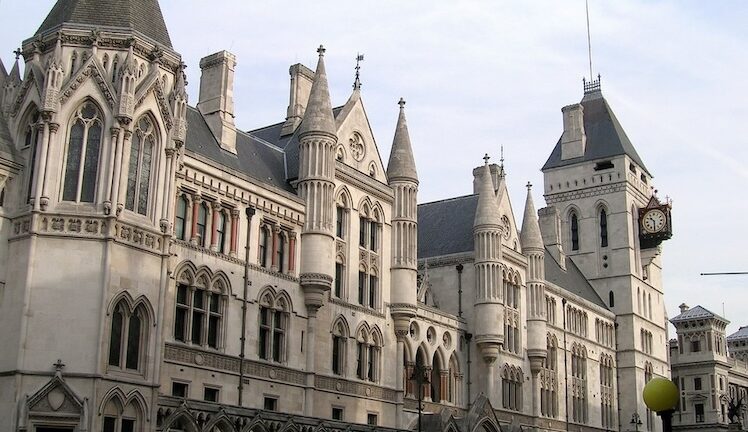Landmark Decision Expands Legal Protections for Victims of Transnational Crime
By Jaya Ramachandran
UK High Court Rules Torture for Ransom Is Human Trafficking Exploitation
Landmark Decision Expands Legal Protections for Victims of Transnational Crime
By Jaya Ramachandran
LONDON | 4 June 2025 (IDN) — In a landmark judgment that could reshape how the United Kingdom treats victims of cross-border crime, the UK High Court has ruled that kidnapping and torture for ransom may constitute exploitation under both domestic and international human trafficking laws.
The decision, handed down on 5 March 2025 in the case of R (AAM) v Secretary of State for the Home Department, found that the Home Office had unlawfully denied protection to an individual abducted, abused, and held for ransom by transnational criminals.
The case was brought by a claimant identified as AAM, who challenged the government’s refusal to recognize him as a victim of human trafficking and modern slavery. AAM provided a detailed account of being kidnapped and subjected to severe physical abuse by captors operating a ransom-for-profit scheme. While Home Office officials did not dispute the facts of his ordeal, they argued it fell outside the legal framework for trafficking-related exploitation.
However, Mr Justice Macdonald rejected that argument, calling the Home Office’s interpretation of the law “unduly narrow” and inconsistent with the protections afforded under international conventions and UK legislation.
Court Rebuffs Narrow Interpretation
The Home Office based its decision on its reading of the UK’s Slavery and Human Trafficking (Definition of Victim) Regulations 2022, as well as Article 4 of the Council of Europe Convention on Action against Trafficking in Human Beings. It argued that exploitation for ransom, though involving extreme abuse, did not amount to trafficking as it lacked elements like forced labor or sexual servitude.
Justice Macdonald disagreed. In his ruling, he emphasized that exploitation, as defined under trafficking law, encompasses a wide spectrum of coercive conduct aimed at profiting from the control and abuse of individuals.
“The statutory framework is intended to protect victims of severe human rights abuses, especially when such abuses are committed with the purpose of economic gain,” he wrote. “To exclude kidnap for ransom from this scope is legally incorrect and morally untenable.”
The judgment concluded that the Home Office had acted unlawfully and ordered a full reassessment of AAM’s case in light of the Court’s findings.
Victory for Victims
Human rights advocates and legal experts have hailed the ruling as a major victory for trafficking survivors and a necessary correction in the UK’s approach to modern slavery claims.
Jeremy Bloom, Consultant Solicitor at Duncan Lewis Solicitors and legal representative for AAM, said the decision would have far-reaching effects.
“The Court has provided crucial guidance on when kidnap for ransom may constitute exploitation in trafficking claims,” Bloom said. “The Home Office’s approach has been shown to be unlawful, unfair, and inhumane. This ruling is a victory not just for our client, but for many others who have faced similar refusals.”
Bloom added that the case highlights ongoing flaws in the way the Home Office handles complex trafficking cases, particularly those involving non-traditional forms of exploitation.
“This judgment will hopefully compel the government to revise its decision-making frameworks and offer proper protection to people who suffer at the hands of organised, profit-driven abuse networks.”
Broader Implications
Legal scholars say the ruling sets a precedent for the UK’s interpretation of trafficking laws and brings the country more in line with international human rights norms.
Professor Anna Gallagher, director of the Global Trafficking Law Centre, said the judgment could be particularly influential in shaping future Home Office policy.
“This case rightly acknowledges that trafficking does not always follow narrow patterns. The exploitation of vulnerable individuals for ransom is one of the most brutal and coercive forms of abuse,” Gallagher said. “It’s time national policy caught up with the evolving nature of transnational crime.”
She noted that this broader interpretation could influence how other countries within the Council of Europe apply the Convention in cases of abduction or forced extortion.
“This ruling is a significant legal milestone for trafficking jurisprudence,” Gallagher added.
AAM’s Case to Be Reconsidered
While the judgment represents a victory in principle, AAM’s case remains unresolved. The High Court has ordered the Home Office to conduct a lawful reassessment of his application, taking into account the ruling’s expanded understanding of exploitation.
Until that process is complete, AAM—who remains unnamed for safety and privacy reasons—must continue to wait for formal recognition as a trafficking victim and the support services that status entails.
According to Duncan Lewis Solicitors, the legal firm representing him, this could include access to housing, psychological support, and legal assistance under the UK’s National Referral Mechanism.
Toward a More Inclusive Definition
The High Court’s ruling may be a turning point in the UK’s treatment of complex trafficking cases. It signals to decision-makers that modern slavery and trafficking laws must be applied in a way that reflects the full range of abuses victims may suffer.
By acknowledging that kidnap for ransom is not just criminal but exploitative under trafficking law, the ruling opens the door to stronger protection mechanisms for victims of emerging forms of coercion. Legal advocates now hope the Home Office will revise its internal guidance accordingly.
As cross-border crime syndicates adopt increasingly sophisticated methods of abuse and profit, experts say the justice system must remain equally adaptive—ensuring victims like AAM are not denied the rights and recognition they are due under the law. [IDN-InDepthNews]
Image: Royal Courts of Justice, London. CC BY-SA 2.0


